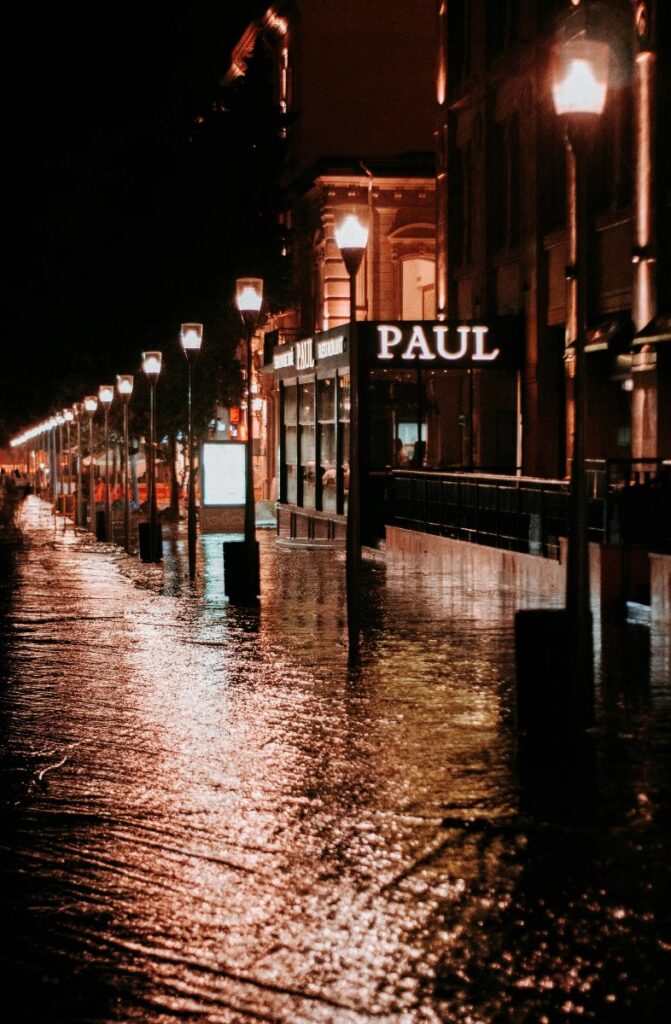What’s the likelihood of my premises flooding?
Flooding at your venue can be devastating. Bad weather over the winter months can severly impact nightlife businesses, storms can happen unexpectedly and without much warning, leaving you very little time to prepare.
The liklihood of your premises flooding is affect by both, the location of your premises, and your preparation. Check the flood risk of your location here via the FloodHub. Precautions you can take to prepare yourself can make a huge difference in the potential coss of a disaster and in the event of an insurance claim.
Here’s our advice on how to better protect your nightclub, pub or late night establishment from flood or storm damage…
Updated as of 2024
Click to check the flood risk in your area
How to prepare for flooding
Keep staff up to date on flood warnings
If your venue is situated near a location known for flooding, you could be at risk again. However, in recent years, warnings have been issued to locations not normally prone to floods as at potential risk. Low lying areas, particularly those close to water such as rivers, streams, lakes or reservoirs, are likely to be at risk. You can check if your venue is at risk of flooding here. For frequent updates on flood risk, check the Environment Agency or BBC Weather website.
We recommend telling the staff or management about any incoming storms so they can prepare themselves, whether this causes travel disruption or potentially helping to clear out the building’s entrance. Hve a plan in place, which involves your staff, to help protect your premises.
Keep on top of your building maintenance
Make sure that drains and gutters are kept clear and in good working order. Don’t leave it until the bad weather hits. Your guttering should be checked by a trained professional at least every six months to make sure it’s kept clear. For insurance purposes, your premises needs to be reviewed annually, and gutters should be cleaned out.
Invest in Flood proofing measures
There are a number of large flood-proofing measures you could take, such as applying water-proofing sealant to exterior walls, sealing floors or replacing wooden floorboards using concrete with a damp-proof membrane. You can also buy automatic flood-proof air bricks, or covers that fit over air bricks when flooding is expected. These improvements range from the basic to the extensive – the benefits of making changes before or after the festive period means less obvious business disruption.
If you think flooding is inevitable, seal the soil drainage to stop any water from getting into the building’s drainage system, thus preventing contaminated water from entering the building. We also recommend fitting a temporary toilet pan seal to prevent the flood water coming back up the toilets. If you want a more long-term solution, you could fit non-return valves to drains and water inlet and outlet pipes, preventing wastewater from flowing back into your property.
Get your sandbags and barriers ready

Make sure you’ve bought sandbags well in advance of the expected rain so they’re ready to be installed at your venue’s doorways if flooding is on its way. Contact your local Environment Agency if you need to know where to get your sandbags or other protective measures.
Turn off the electricity
Turn off any electric at your venue if flooding is predicted. Failing to do so can cause immense damage and increase the cost of repairs significantly. You should also close off flow valves.
Moving equipment and carpets
If you know flooding is incoming, you should try to move all expensive equipment to a higher floor of your venue, or move heavier equipment onto plinths for elevation. This will help you after the event to open faster, reducing business interruption as there’ll be less damage to your venue and you’ll also be able to clean up quicker.
It’s also worth taking up carpets and moving them to a higher floor to minimise damage and allow for a faster clean-up. If you have any outdoor equipment or external storage, make sure these are moved or secured to prevent damage.
A rule for always – Your important documents should be kept in a watertight plastic bag or container and kept on a higher floor, or even away from the premises altogether.
Route the water flow
If your venue has a basement, make sure it’s kept clear if bad weather is on its way. This allows you, in an emergency, to route the water flow to the basement and then actively pump the water out. It is far better to flood an empty basement than replace damage to the ground floor of your club, bar or restaurant.
Keep a record
It’s always a good idea to document your preventative measures. This will help prove you tried to minimise damage where possible. For any measures, damages or claims – keep your own records and documentation – this will help insurers and brokers understand your claims history if the information isn’t immediately available.
Get prepared for the clean-up
Have a drying company on standby, so you can start the drying process as soon as possible. They’ll set up industrial dehumidifiers to avoid permanent damage. Dehumidifiers should dramatically reduce the number of weeks it takes to bring your venue back to operation.
A competent drying company is essential for the recovery of your premises, as they will need to continually visit your premises – contact NDML to arrange a professional contractor for you.

What should you do if you’ve been affected by flooding?
Don’t throw anything away
Keep copies of all letters, emails and faxes you send and receive. Once you can enter your venue safely, you should not remove or replace any items (even if they’re damaged) without prior approval from the insurance company. There is a slight exception… if you need to throw away contaminated food or perishable goods then you should – just make a note of anything you throw away (particularly if this is covered by your insurance) as stock should also be covered.
Gather evidence
Photographs are essential. Take photographs and video footage of any and all damage to your property, including photographic evidence of all equipment (such as machines and other goods covered by your policy).
You should also record every detail of the flood damage once you can safely enter your venue, making notes about every item that is affected and the extent of the damage. You should mark the height of flood water on the wall with a permanent market in every affected room too.

Arrange emergency repairs
You may want to hire an external company to work on emergency repairs straight away, such as fixing electrical fittings. It’s important to keep receipts of all emergency repair work you have done.
You should keep a detailed record of all correspondence with anyone involved in the clear-up or repairs. Note down who you spoke to, the date of the call or message, the time you made or received any messages, and what was agreed.
Where possible you should try to get an estimate for the full repair of your establishment, including a full breakdown of the costs involved.
Make sure you’re adequately insured
The affects of a flood or storm can be devastating, but even more so if the repairs have to come entirely out of your own pocket. Flooding is a type of damage that can sometimes be missing from standard insurance coverage wording, or come with a high excess. Make sure you clarify this with your insurer or broker if you have any concerns.
For a confidential review of your insurance policy, contact the NDML team. We’ll be happy to help.







